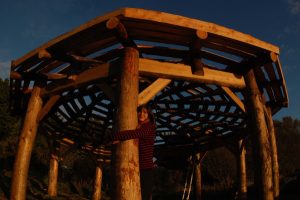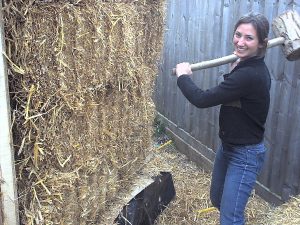This blog is about the house that Charlie and Meg built. It’s a straw-bale roundhouse with a reciprocal roof, built in the countryside where they grew up. The exterior can be seen above, the interior below, with Charlie, Meg and sprog in the middle. We’ve blogged about Charlie and Meg’s house before – here – when Pembrokeshire council told them that it was ‘harmful to the rural character of the locality’, and had to go.
Now there’s a hearing – next Tuesday, Jun 24th – to decide on their application for retrospective planning permission. The recommendation to the planning committee is that it should be refused and that the house should be dismantled. We’d like you to help challenge that recommendation, and we’d also like to make an appeal to the planners of Pembrokeshire. There are four things that you can do at the bottom of this blog.
Let’s start with two questions. First, a simple yes or no question based on the specifics of this case. Do you think this house is harmful to the rural character of its location? And secondly, let’s talk about the concept of families building their own homes. What do you think about that? Do you think it’s something to be generally encouraged or discouraged in society?
It’s quite a complicated and emotive subject. For instance, I don’t think many of us want to see the countryside begin to fill up with bricks, mortar and tarmac, with all the new infrastructure and damage to the countryside that that would entail, and with people commuting long distances to jobs in cities. But what if the homes weren’t made of bricks and mortar, and what if no new infrastructure were required? And what if there was no commuting?
Every day, our friend Oliver at NaturalHomes.org publishes a picture of a beautiful, self-built home. He’s very popular on Facebook, with almost 400,000 followers. These kinds of homes, built from natural, local materials, that would disappear back into nature in a few years if abandoned, clearly appeal to people. But these kinds of natural, self-built homes don’t house commuters, or plasma-screen TVs or triple garages. There is a lifestyle that goes with them, and it’s a lifestyle in harmony with nature, and reliant on the local for sustenance. The question is – is this a good lifestyle, or a bad one? If it’s good, let’s encourage it.
 If so, good – but let’s take it a step further. Let’s allow some of our young people to escape from the corporate world if they want to. Charlie and Meg’s house cost £15,000, which they managed to get together somehow, and now they don’t have a mortgage. And Charlie’s is a high-quality house. If you don’t want the prettiness, people have built homes for £3000, and are living very comfortably. So Charlie and Meg don’t have to do pointless jobs to pay a mortgage (literally, a ‘death pledge’); they don’t have credit cards; they want to feed themselves mainly on things that they’ve grown; and they want to maintain the house that they built, harvest their own energy and water, and deal with their own waste. Let them try. They don’t want to ‘drop out’ of anything. They want to grow things, produce things, trade. But this could be a model. Let’s see how they do. Low-impact living isn’t possible within the corporate system, because of the amount of debt imposed on us by banks, who didn’t even have the money to lend us in the first place, for the right to a roof over our heads. Many of us are perfectly capable of building our own home, and for each one who can, there are ten willing to learn. But instead, we’re in debt to bankers, we have to pay them interest for the privilege, and work in the corporate system to get the money to pay it.Do you honestly think that what Charlie & Meg are doing is wrong? I’d like to bet that most of you don’t, and if that’s the case, then let’s change the law, and the planning system. Let’s not just ‘permit’ people to do this – let’s encourage them. It’s a fine way for our young people to grow families – to teach their kids to build homes, grow food and respect nature. It will produce better people. We’re moving in the right direction I think – in the West, men and women are now considered equal by most people, different races mix easily and happily and sexual orientation is becoming much less of an issue. These may seem trivial or obvious, but it wasn’t like that a couple of generations ago. Would it be fair to say that we’re improving – that each generation is getting slightly better?
If so, good – but let’s take it a step further. Let’s allow some of our young people to escape from the corporate world if they want to. Charlie and Meg’s house cost £15,000, which they managed to get together somehow, and now they don’t have a mortgage. And Charlie’s is a high-quality house. If you don’t want the prettiness, people have built homes for £3000, and are living very comfortably. So Charlie and Meg don’t have to do pointless jobs to pay a mortgage (literally, a ‘death pledge’); they don’t have credit cards; they want to feed themselves mainly on things that they’ve grown; and they want to maintain the house that they built, harvest their own energy and water, and deal with their own waste. Let them try. They don’t want to ‘drop out’ of anything. They want to grow things, produce things, trade. But this could be a model. Let’s see how they do. Low-impact living isn’t possible within the corporate system, because of the amount of debt imposed on us by banks, who didn’t even have the money to lend us in the first place, for the right to a roof over our heads. Many of us are perfectly capable of building our own home, and for each one who can, there are ten willing to learn. But instead, we’re in debt to bankers, we have to pay them interest for the privilege, and work in the corporate system to get the money to pay it.Do you honestly think that what Charlie & Meg are doing is wrong? I’d like to bet that most of you don’t, and if that’s the case, then let’s change the law, and the planning system. Let’s not just ‘permit’ people to do this – let’s encourage them. It’s a fine way for our young people to grow families – to teach their kids to build homes, grow food and respect nature. It will produce better people. We’re moving in the right direction I think – in the West, men and women are now considered equal by most people, different races mix easily and happily and sexual orientation is becoming much less of an issue. These may seem trivial or obvious, but it wasn’t like that a couple of generations ago. Would it be fair to say that we’re improving – that each generation is getting slightly better?
‘The system’ isn’t a person. It can’t make value judgements – it can only grow or die, in response to our economic activity. Humans, on the other hand, can make value judgements. This is an appeal to planners. Can we have the conversation above? Tell us what your values are. If your job means stopping us trying things that may well be beneficial to us as a species – and in fact that most people agree would probably be beneficial, then I’m asking you to speak up. Let’s have this conversation. A house like Charlie & Meg’s is not the same as a bricks & mortar commuter home, and to say that it doesn’t fit the character of a rural location is plain silly. Let’s talk about allowing people to live in the countryside as long as they build a house and live a life that is close to the land and in harmony with nature. It would be more beneficial to the environment than large, monoculture farming with pesticides, and bricks & mortar housing estates – plus smallholdings produce more food per hectare than larger farms.
Here are three things you can do:
- post something on Pembrokeshire council’s Facebook page; don’t be rude, just let them know how you feel
- sign the official petition in support of retrospective planning permission; it already has close to 100,000 signatures!
- if you live in Pembrokeshire, the BBC would like to hear your opinion – pass your contact details and comment to [email protected] and they will forward them to the BBC news desk
- share this page













